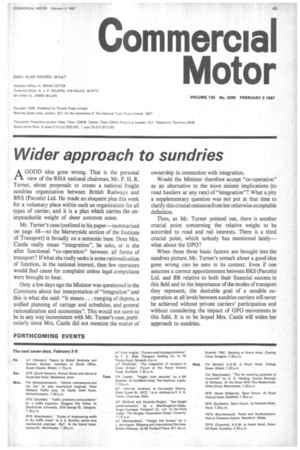Wider approach to sundries
Page 47

If you've noticed an error in this article please click here to report it so we can fix it.
AGOOD idea gone wrong. That is the personal view of the RHA national chairman, Mr. P. H. R. Turner, about proposals to create a national freight sundries organization between British Railways and BRS (Parcels) Ltd. He made an eloquent plea this week for a voluntary place within such an organization for all types of carrier, and it is a plan which carries the unimpeachable weight of sheer common sense.
Mr. Turner's case (outlined in his paper—summarized on page 48—to the Merseyside section of the Institute of Transport) is broadly on a semantic base. Does Mrs. Castle really mean "integration", he asks, or is she after functional "co-operation" between all forms of transport? If what she really seeks is some rationalization of function, in the national interest, then few operators would find cause for complaint unless legal compulsion were brought to bear.
Only a few days ago the Minister was questioned in the Commons about her interpretation of "integration" and this is what she said: "It means . . . merging of depots, a unified planning of cartage and schedules, and general rationalization and economies". This would not seem to be in any way inconsistent with Mr. Turner's case, particularly since Mrs. Castle did not mention the matter of ownership in connection with integration.
Would the Minister therefore accept "co-operation" as an alternative to the more sinister implications (to road hauliers at any rate) of "integration"? What a pity a supplementary question was not put at that time to clarify this crucial omission from her otherwise acceptable definition.
Then, as Mr. Turner pointed out, there is another crucial point concerning the relative weight to be accorded to road and rail interests. There is a third crucial point, which nobody has mentioned lately— what about the GPO?
When these three basic factors are brought into the sundries picture, Mr. Turner's remark about a good idea gone wrong can be seen in its context. Even if one assumes a correct apportionment between BRS (Parcels) Ltd. and BR relative to both their financial success in this field and to the importance of the modes of transport they represent, the desirable goal of a sensible cooperation at all levels between sundries carriers will never be achieved without private carriers' participation and without considering the impact of GPO movements in this field. It is to be hoped Mrs. Castle will widen her approach to sundries.
















































































































































































